- Home
- Nick Carter
The Fanatics of Al Asad Page 13
The Fanatics of Al Asad Read online
Page 13
I'd gotten them all.
Or had I?
Cautiously, I began backing toward the corridor that led to the bedrooms. There still might be one in the living room that I couldn't see. Or one of them might be playing possum. I didn't have time to check them out.
I turned and ran down the corridor. Quickly, I checked out the two bedrooms in which I knew the prisoner was not being held. If any of the terrorists were there, I wanted to know.
They were both empty. So were the connecting baths.
I checked out the guest bathroom. Empty.
Now, I went back to the door of the room in which the President was being held captive.
I didn't dare try the knob. I remembered what the orders to the guards had been: "If he comes after him, kill the man!"
Quietly, I knelt down on the floor, trying to see if there was space enough between the bottom of the door and the sill, so that I could insert the tip of the nozzle. If I could do that, I could spray the room full of gas and knock out the guards before they knew what was happening. The gas wasn't lethal. All it would do would be to render them unconscious for twenty-four to thirty-six hours.
Which meant it wouldn't harm the President either.
There was practically no room. The bottom edge of the door actually pressed down the high pile of the wall-to-wall carpeting. I knelt down on both knees, putting my head close to the floor as I tried to slide the quarter-inch tip of the spray nozzle under the door.
The brass tubing scraped gently along the bottom of the door. It was the faintest of sounds, but I stopped and waited, my breath coming in shallow, slow inhalations because of the tension built up in me. Every nerve was on edge.
Nothing happened.
Once again, I began to push the brass nozzle under the door, trying to get it into the room.
And then, suddenly, the door was ripped back, flung wide open in one swift motion.
I had barely time enough to see a hand swinging down. There was a gun in the hand and a frenzied face floating in the air above it.
As if in ultra-slow motion, everything that happened to me in that fraction of a second seemed to take an eternity to occur. Each movement was like a long, drifting ballet movement performed under water.
I tried to rise to my feet, to throw myself backwards away from the blow.
The gun and the hand holding it slid smoothly out of my angle of vision. My head twisted away from the weapon. A knee floated into view and caught me under the chin. My head drifted up and to the side.
Still in the slowest of slow motions, the downward sweep of the arm and hand and gun came back into my sight again, growing larger and larger until it filled my sight from horizon to horizon. An enormity of fist and gun and white, tensed knuckles swept inexorably toward my skull.
Blackness enfolded me, lit by pinpoints of brilliant flashes of crimson and bright white, like an electronic strobe winking rapidly on and off in a desert night.
For one millisecond, I felt my muscles suddenly and unwillingly relax, and then I was so deep into the blackness that I knew no more.
* * *
Friday. 10:42 a.m. Apartment 12-H. Upper East Side.
The face looming in my sight was dark and heavily stubbled with a two day growth of beard. It was as if I were looking at it on a giant movie screen from the first row. I could see every hair magnified to an enormous size.
There was a moustache under the hooked, Semitic nose, and the face was oval, with a weak, receding chin.
Then the face drew back and I could see the pear-shaped, heavy body on which it rested.
Sahrif al-Sallal! The leader of Al Asad.
I'd never expected to see him. Not in a situation like this. Surely, he must know that he and his men could never escape from this last hide-out. Or did he believe differently? If he didn't, if he knew he couldn't escape, it could only mean that he expected to die — that he sought martyrdom deliberately.
The brown eyes never stopped watching me. Now he said, "You are awake?"
I didn't have to make a reply.
My eyes flicked around the room. I was back in the living room, lying on the oversized sofa, my arms and legs bound. The miniature gas mask was gone from my face. I smelled the sharp odor of the ammonia which they'd pressed under my nose to bring me back to consciousness.
Sharif al Sallal stood over me. About ten feet away, holding an automatic rifle trained on my gut, was a terrorist. His white shirt was baggy around the middle. His black pants were held up by a knotted necktie. They were wrinkled and too long for him, sagging over his shoes. Like the others, he needed a shave. And like the others, he had a wild, merciless look in his eyes.
Sallal spoke gravely, his voice high-pitched for a man as heavy set as he was.
"I have been told that you are Nick Carter. Is that true?"
"Yes." I wondered where he'd gotten that information.
He rubbed the stubble on his face with his right hand. Being unshaven, and yet beardless, seemed to be a symbol among the Palestinian guerillas. Yasir Arafat had set the style for them just as Fidel Castro's beard had been a symbol for Latin-American revolutionaries.
He turned serious eyes on me.
"Are you Jewish, Carter?"
What the hell kind of a question was that to ask?
I shook my head. "No."
Al Sallal seemed puzzled. "Then why are you fighting for them?" he asked. "Why do you oppose the destiny of a people who are fighting for a land of their own?"
I was confused until I realized that he was talking about the Palestinian refugees, not the Israelis.
"Allah has promised us our Own land," he intoned, switching to Arabic, his eyes beginning to take on a fanatical gleam. "I have been sent by Allah, Himself, as the new Prophet, to lead my people in a holy Jihad against the infidel Jews! We shall slaughter them! Every one of them! None shall be spared! Not only the men, but the children because they grow up to be men! Not only the children, but the women and girls because they breed men! There will be a bloodbath from Tel Aviv to Jerusalem! From Syria to Sinai! This is the land that is rightfully ours! It can only be cleansed by the blood of the accursed Israelis!"
Spittle began to form in the corners of al Sallal's mouth as he ranted on. Arabic is the language of the poetic Thousand and One Nights. It's a language designed to inflame the passions of men by the beauty of its imagery. The words form themselves into a rising and falling rhythmic chant that carries the listener away so that he is controlled by his emotions rather than by reason.
It's a language of superlatives and hyperboles and exaggerated metaphors. It's dramatic and colorful, and to swear in Arabic makes swearing in any other language drab and lifeless.
Arabs admire orators. Sharif al Sallal was among the best I'd ever heard — and I'd heard them from Rabat to Damascus. I could easily imagine him shouting to a surrounding throng of wild-eyed refugees in a marketplace in Beirut or Amman, sweeping them along with him in a flood by the sheer power and excitement of his words.
"We shall carry the word of the Qur'an into every village! We shall bring death to every infidel who desecrates our holy Land of Palestine with his presence! The country shall be ours! Allah has promised it. In the Twenty-eighth Surah of the Quran are the very words!"
He closed his eyes and recited, "Allah who gave you the Quran shall restore you to your homeland!"
In my mind, I heard Tamar's voice as she recited the same words back in Washington. It seemed like an eternity ago. Yet it was only last Tuesday night.
Sharif al Sallal stopped talking.
He stared down at me. I could read my death sentence in his eyes.
Before he could speak, I cut in, sharply. "Why did you come back here?" I asked boldly, taking the chance that al Sallal hadn't been anywhere in the apartment when I'd come in.
"To show my followers the sword of Allah," he replied simply.
I was puzzled. What sort of allusion was this?
"The sword of Allah?" I asked.
In answer, al Sallal turned away. He strode to the corner of the room and picked up an object.
"This!" he said exultantly, unwrapping the cloth that surrounded the object.
"Behold! The sword of Allah!"
The scimitar he held up flashed in the fight, its blade a gleaming curve of polished steel. Its haft and hilt were inset with rubies and emeralds. The metal of the blade was chased with delicate engraving.
"The sword of Allah!" he shouted again, his voice rising to a scream.
The man was a complete lunatic, as much a prisoner of his own rantings as the most credible of his followers!
Sallal looked across the room at me. "It must drink the blood of an infidel!"
I began to get the idea he had in mind for me, and I didn't like it at all.
Sallal came over to the couch, looking down on me. I could understand why his followers succumbed to his personality. The man radiated a charisma of repressed violence. He gave off waves of sheer animosity and anger that would have the strongest of all appeals to men frustrated by a lifetime of poverty.
He had grasped the scimitar in his right hand. Now he turned his fist down to aim the blade at my throat. Slowly, he lowered the blade until the point rested on the skin of my throat.
Forcing myself to be calm, I said in Arabic, "What you plan to do with me would defile the sword of Allah. Would you put a curse on it?"
I caught him by surprise. His eyes widened. He released the pressure of the blade on my throat.
"What do you mean?"
"The sword of Allah was carried by the Prophet himself," I pointed out. "It drank blood only in battle."
For a moment, al Sallal pondered what I'd said. Then he nodded soberly. "You are right. Only in battle."
He took the blade away from my throat. I swallowed hard. The man was crazy, but there was enough rationality left in him so that he could think logically.
"We will fight," he said simply. "Yes. We will fight."
I laughed at him.
"What kind of a fight would that be?" I taunted. "I'm tied hand and foot with no weapon to defend myself with. You make a mockery of the sword of Allah!"
The words got under his skin.
The scimitar blade flashed in the air, sweeping down at me before I could draw a breath. The keen edge of the blade slit the ropes holding my wrist with the first slash, the second cut the bonds at my ankles. Cleanly severed, the bindings dropped away.
Slowly, stretching my muscles, I sat up.
"On your feet!" al Sallal ordered. I stood up.
The guard across the room lifted his automatic rifle higher, keeping the muzzle still trained on me. I was sure he had the selector lever set on automatic fire.
"I have no weapon," I reminded al Sallal.
Sahrif al Sallal let out a muttered curse. Holding the point of the scimitar at my throat, he shouted an order to the guard.
"By the beard of the Prophet, get him a blade!"
The guard didn't hesitate one second. Sharif al Sallal's slightest whim was his command. He ran out of the room. In a moment, he was back, carrying a second scimitar.
It was a plain blade, yet as he handed it to me, I noticed that the edge had been newly honed to razor sharpness. I hefted it in my hand. It had a decent balance. I looked at the blade and then at al Sallal, lifting my eyebrow quizzically.
He nodded. "Yes. We were going to use it to kill your President. Until this morning, when a courier from my headquarters in Damascus brought me this one." He held up the jewelled scimitar in his hand.
Again the look in his eye held a growing gleam of madness as he stared at the naked steel in his hand.
He stepped away from me.
"Now," he said, "now, the sword of Allah will drink the blood of an infidel in battle."
Without warning, he swung at me.
He nearly caught me off guard. At the last second, I leaped away, barely avoiding the blow.
My muscles were stiff from having been tied up. The circulation in my arms and legs was sluggish. I ached all over from the exertions of the night before. The wound in my back pained me. I could feel the stitches tear loose as I leaped violently away from al Sallal.
He swung twice at me, the blade first sweeping horizontally at my midsection, and then at the end of the short swing, a quick reversal of the blade edge and a backhanded blow swinging at my face.
A scimitar has a long, deep curve to it, with the convex edge sharpened to microscopic thinness. A good blade of Damascus steel can be honed so sharp that you can shave as closely with it as with a barber's razor.
Dueling with a scimitar isn't like fencing with an epée or a foil. It's more like a saber, although with a scimitar it's a slashing blow that does the damage. You can use the point, too. Both are lethal.
Sharif al Sallal's blade was made of the finest Damascus steel. The blade I had was shoddy compared to it.
Once again, he swung at me. I parried desperately. Steel clashed in ringing blows as the blades slammed into each other time after time.
Sallal drove me back step by step around the room. I had to keep one eye out for the furniture as I backpedalled. One trip or slip or bump that threw me off balance could mean instant death for me. Sallal was superb with a scimitar.
He knew how good he was. I could see the mad gleam in his eyes as he attacked again and again. With a growing, sick feeling, I realized that he was toying with me, playing a game for his own malicious amusement, knowing all the time that he could put me away any time he felt like it!
I retreated more. Out of the corner of my eye, I could see the guard. He was in a corner of the room where he would be out of the way. His rifle was still aimed at me.
I called al Sallal's attention to him, jeeringly.
"Do you need a man to shoot me in the back so you can defeat me?" I asked mockingly. "And if I injure you — will he kill me? What kind of bravery is that?"
Sharif's face turned hard with anger.
"I need no help!" he shouted at me.
"You insult the sword of Allah!" I sneered at him, my breath coming in gasps. "It is being held by a coward."
Sharif cursed me again.
"Are you brave enough to tell him to put down his rifle?" I demanded. "Or are you all words? Show me, Sallal! Talk is for women, not men!"
Without turning his head, al Sallal screamed at the guard. "Put down that rifle! I do not need you to protect me!"
Hesitatingly, the guard slowly lowered the gun.
"He still holds it," I pointed out sharply to al Sallal. "Even your own man does not believe you are brave enough to fight me without his protection!"
Sharif's voice rose to a frenzy.
"I shall have you castrated!" he screamed at the guard. "Put away that rifle!"
The guard flicked the lever onto "safety" and bent forward to place the rifle on the floor. At that moment, when his torso was at an angle to the floor, with his head outstretched, I leaped past al Sallal, swinging my scimitar as hard as I could.
The blade flashed down with all the power I could muster in my back and arm. The keen edge met the back of the guard's neck cleanly, like a butcher's cleaver chopping a rib joint, cutting between two vertebrae, severing the spinal cord, neck tendons and windpipe in one blow!
His head fell away from his body, like a ripe melon dropping from the vine. Blood leaped out of the severed arteries and veins, splashing bright red gouts as he fell.
I spun back to meet Sharif's furious attack. He let out an enraged cry and sprang at me, his scimitar a whirlwind of bright, dangerous steel flashing around my head. I parried blow after blow until my right arm felt numb and almost useless.
On the floor, staring sightlessly up at us, the guard's severed head lay several feet away from his body — a grotesque, horrible spectator to our battle.
Blood flowed down my back where the stitches in Khatib's knife wound had parted. My shoulder muscles and arm, already wearied by the efforts of the last twenty-four hours,
refused to go on much longer.
Al Sallal cut viciously at my legs. I sprang to one side and leaped back again, only to throw myself in a sprawl on the floor because his backhanded blow nearly took my head off! Time after time, my parries were almost too late. Our blades clashed ringingly against each other again and again, and each time, al Sallal drove me back.
A steady, chanting flow of Arabic poured from his lips as he fought. Sharif al Sallal was lost in some inner world of his own, seeking the mad pleasure of killing the infidel enemy, offering his own death if he were bested. To die in battle sends the Moslem warrior directly to Paradise.
I ducked desperately away from his slashing, cutting attack, using an armchair as protection. I leaped away from it as al Sallal swung his scimitar in a frenzied flail of steel.
By now, I could hardly see straight. My head hurt from the gun butt blow that had knocked me out. My eyes saw Sallal only through a haze of double images, flashes of brightness and tiny blackouts, first in one eye and then in the other.
I didn't know how much longer I could go on defending myself. Sallal was so much better with the scimitar than I was. It was as if he'd been born with the damn weapon in his hand and had spent his life perfecting the rhythm of attack and counterattack.
As he lifted his scimitar for another series of attacks, I made a dive for the dead Palestinian's body sprawled headlessly some ten feet away from us. Beside it was the automatic rifle he'd been carrying. It was the only weapon in sight.
Sallal saw my intention and reacted almost as fast as I did. He leaped after me, his scimitar swinging as he howled the name of Allah. He cried it aloud in the same way that the great hordes of Mohammed did on their sweep across the barren wastes of the Sahara! As they did when they took Cairo and Alexandria! As they did when they conquered almost all of Spain!
"Allah, il Allah! Allah, il Allah!"
Sharif's blade missed me only by a fraction of an inch as I hit the floor beside the terrorist's body. Instinctively, my eye froze a picture of his legs slightly off balance. In an instantaneous muscle reaction, my right leg kicked out, catching him on the ankle, kicking his feet out from under him.

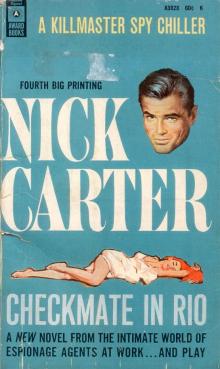 Checkmate in Rio
Checkmate in Rio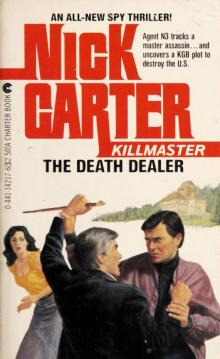 The Death Dealer
The Death Dealer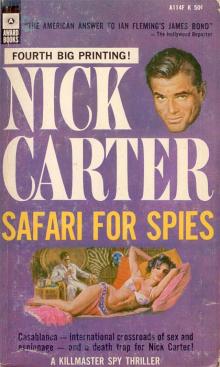 Safari for Spies
Safari for Spies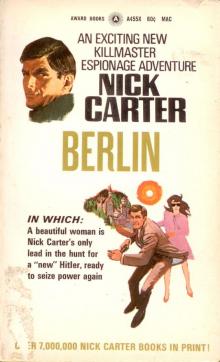 Berlin
Berlin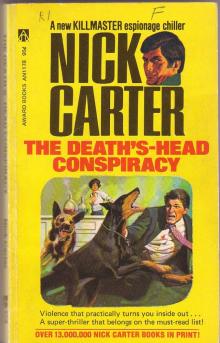 The Death’s Head Conspiracy
The Death’s Head Conspiracy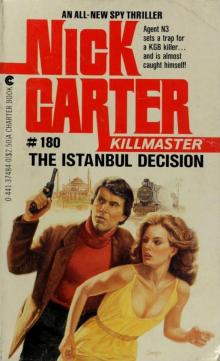 The Istanbul Decision
The Istanbul Decision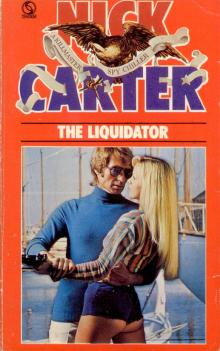 The Liquidator
The Liquidator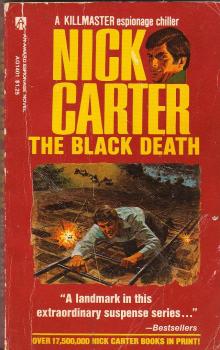 The Black Death
The Black Death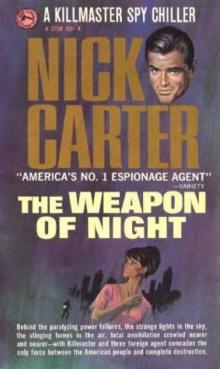 The Weapon of Night
The Weapon of Night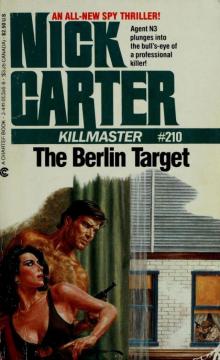 The Berlin Target
The Berlin Target Temple of Fear
Temple of Fear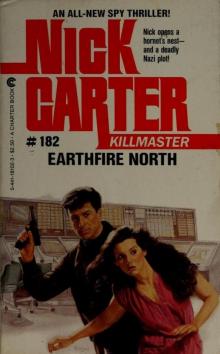 Earthfire North
Earthfire North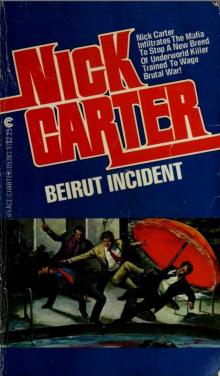 Beirut Incident
Beirut Incident White Death
White Death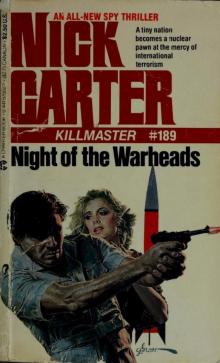 Night of the Warheads
Night of the Warheads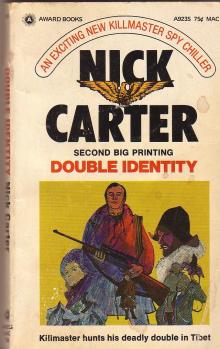 Double Identity
Double Identity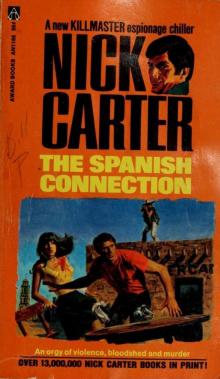 The Spanish Connection
The Spanish Connection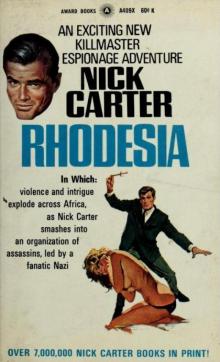 Rhodesia
Rhodesia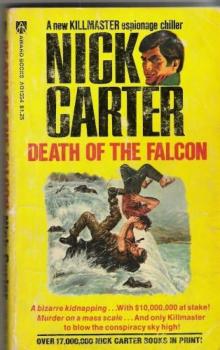 Death of the Falcon
Death of the Falcon The Executioners
The Executioners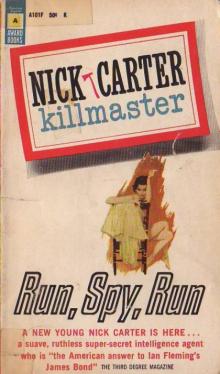 Run, Spy, Run
Run, Spy, Run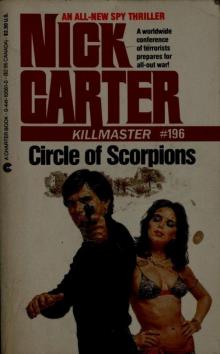 Circle of Scorpions
Circle of Scorpions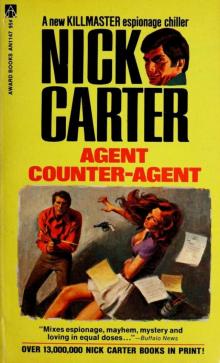 Agent Counter-Agent
Agent Counter-Agent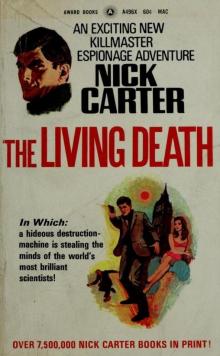 The Living Death
The Living Death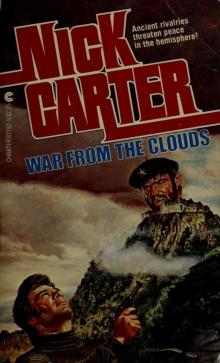 War From The Clouds
War From The Clouds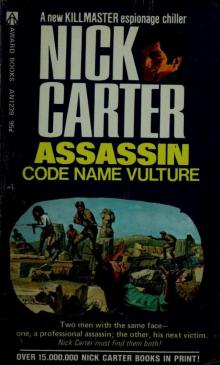 Assassin: Code Name Vulture
Assassin: Code Name Vulture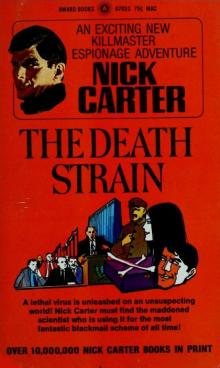 The Death Strain
The Death Strain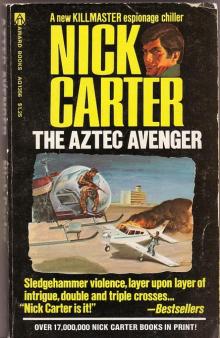 The Aztec Avenger
The Aztec Avenger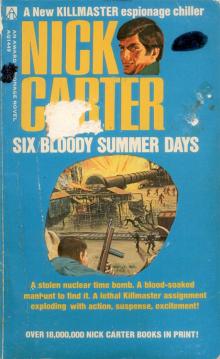 Six Bloody Summer Days
Six Bloody Summer Days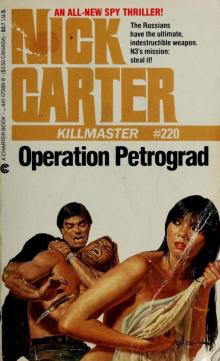 Operation Petrograd
Operation Petrograd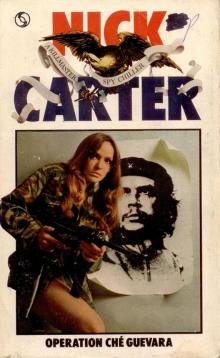 Operation Che Guevara
Operation Che Guevara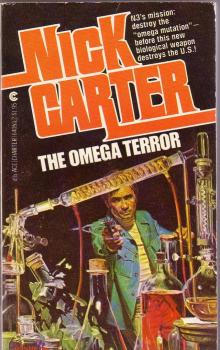 The Omega Terror
The Omega Terror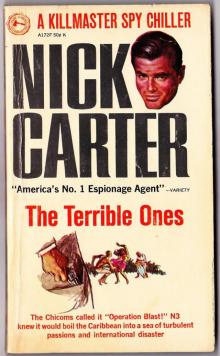 The Terrible Ones
The Terrible Ones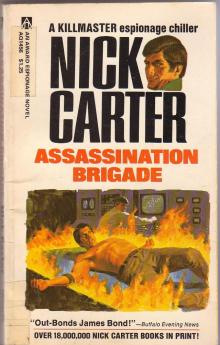 Assassination Brigade
Assassination Brigade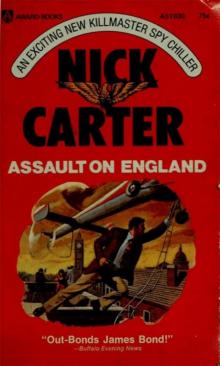 Assault on England
Assault on England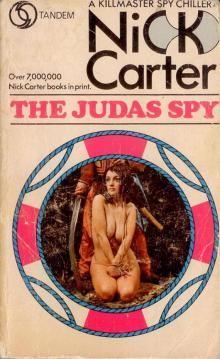 The Judas Spy
The Judas Spy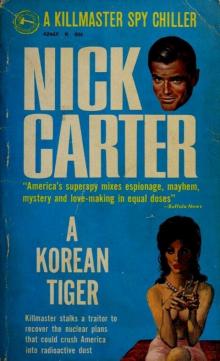 A Korean Tiger
A Korean Tiger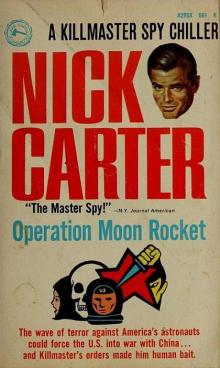 Operation Moon Rocket
Operation Moon Rocket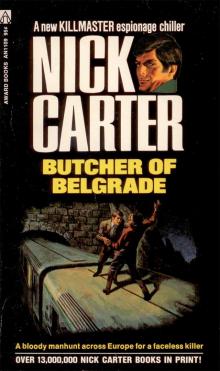 Butcher of Belgrade
Butcher of Belgrade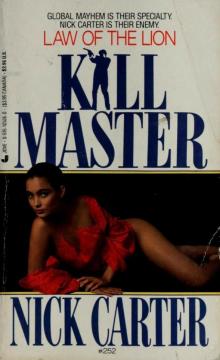 Law of the Lion
Law of the Lion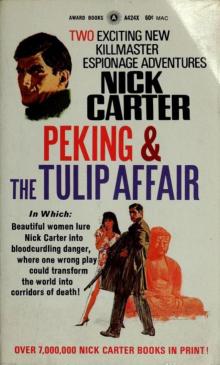 Peking & The Tulip Affair
Peking & The Tulip Affair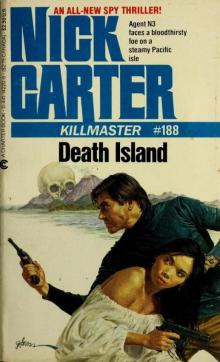 Death Island
Death Island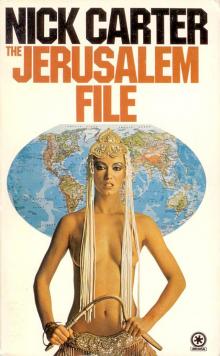 The Jerusalem File
The Jerusalem File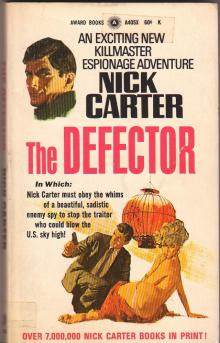 The Defector
The Defector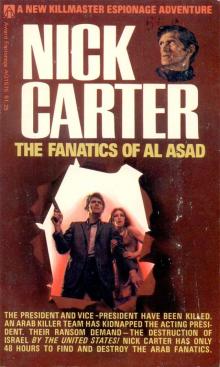 The Fanatics of Al Asad
The Fanatics of Al Asad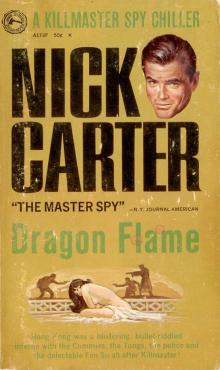 Dragon Flame
Dragon Flame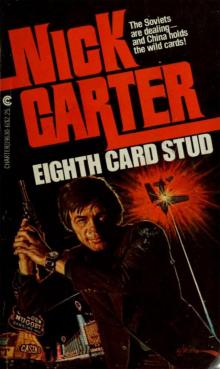 Eighth Card Stud
Eighth Card Stud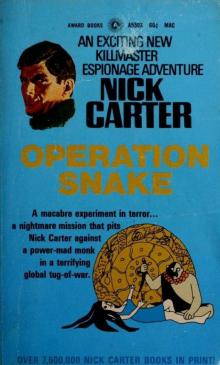 Operation Snake
Operation Snake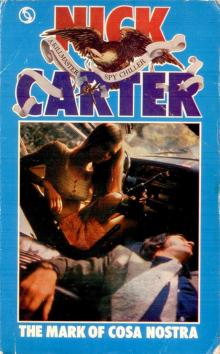 The Mark of Cosa Nostra
The Mark of Cosa Nostra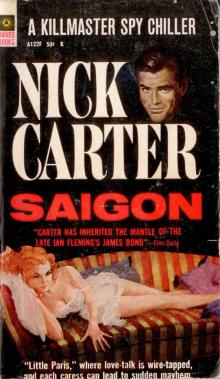 Saigon
Saigon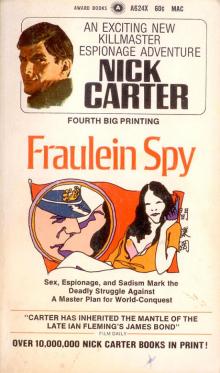 Fraulein Spy
Fraulein Spy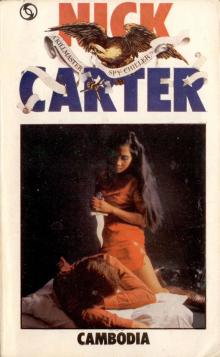 Cambodia
Cambodia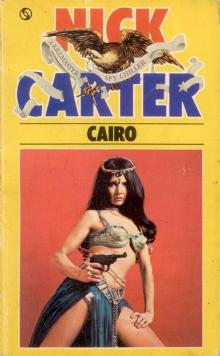 Cairo
Cairo